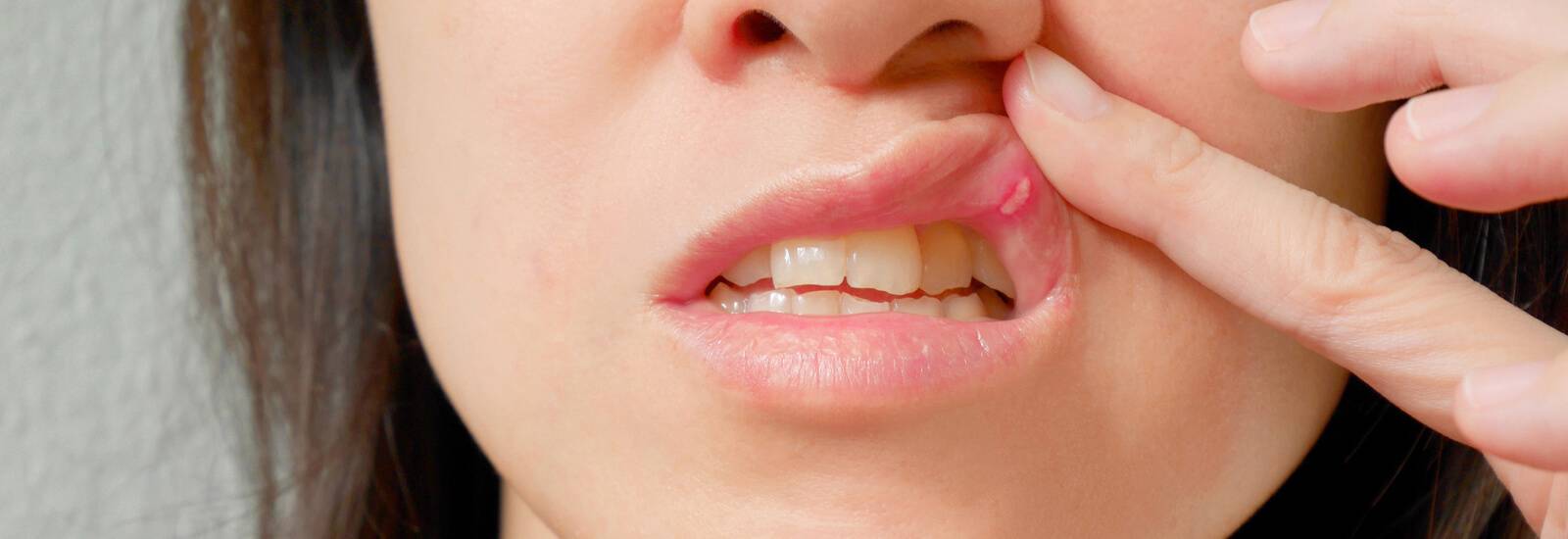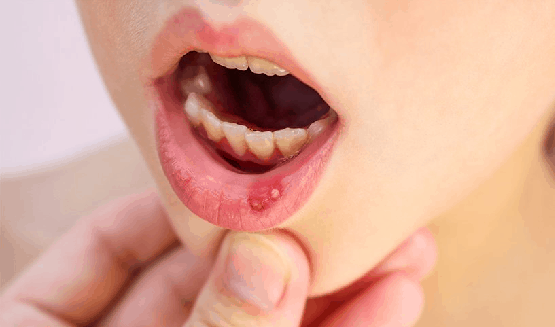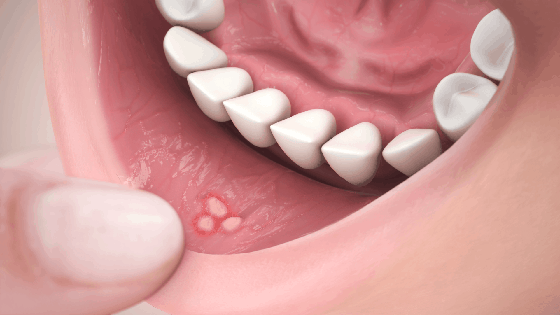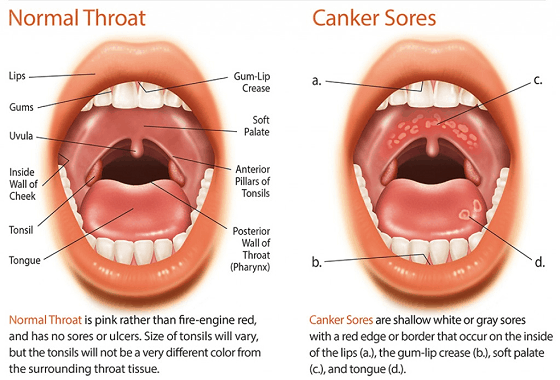Canker Sore Treatment
A canker sore is a small, shallow open wound (or ulcer) in your mouth that can make eating and talking uncomfortable. They’re also known as aphthous ulcers. Most canker sores go away on their own without any treatment in a week or two. Check with our dentists if you have unusually large or painful ulcers or canker sores that don’t seem to heal.

Talk to a Dentist Now!
Table of content
- What are the symptoms of canker sores?
- Minor canker sores
- Major canker sores
- Herpetiform sores
- What causes canker sores in the mouth?
- Why do people get canker sores?
- Canker Sores Diagnosis
- What gets rid of canker sores fast?
- Can a doctor help with canker sores?
- How dentists at SABKA DENTIST can help to Cure Canker Sore?
What are the symptoms of canker sores?
Aphthous ulcers start as reddened, flat macules on the mucosa, then progress to ulcers with a yellow-grey fibrinous membrane that can be scraped away.
The ulcer is enclosed by a reddish ring. They can happen inside your mouth, under your tongue, inside your cheeks, or even inside your lips. A day or two before the sores emerge, you can feel discomfort or a burning sensation in your mouth.

There are three main categories due to which canker sores occur, including minor, major and herpetiform sores and harm one’s part of the mouth and as a result, oral health suffers.
Minor canker sores
- Minor canker sores are the most common
- They are usually small.
- They are oval-shaped with a red edge.
- Heal without scarring in one to two weeks.
Major canker sores
- Major canker sores are less common
- Are larger and deeper than minor canker sores.
- Are usually round with defined borders, but may have irregular edges when it becomes large
- It can be extremely painful.
- May take up to six weeks or more to heal and can leave extensive scarring.
Herpetiform sores
- They are pinpoint-sized
- Occur in clusters of 10 to 100 sores, but may merge into one large ulcer
- Have irregular edges
- Heal without scarring in one to two weeks
- Consult your doctor if you experience.

What causes canker sores in the mouth?
The exact cause of canker sores is unknown, but researchers and health care professionals believe that a variety of factors, often in the same individual, lead to outbreaks. Canker sores are caused by a variety of factors., like:
- Any smaller injury caused while food chewing, hard brushing activity, mishaps during sports activity, etc.
- Overeating of food like coffee, chocolates, nuts, cheese, or any spicy food.
- Lack of some nutrients like calcium, vitamin B-12, iron, etc.
- Excessive bacteria development in the mouth.
- Improper fitting of the dental apparatus
Why do people get canker sores?
Canker sores can affect anyone. However, they are more common in teenagers and young adults, especially females. Recurrent canker sores are often caused by a genetic disorder. This could be due to a shared factor in the climate, such as certain foods or allergens, or it could be due to family history.
Canker Sores Diagnosis
Canker sores, on the whole, is serious. If you have a dental emergency, contact your dentist right away:
- Bizarrely enormous bruises
- Bruises that spread
- Pain and inflammation
- Bruises that most recent 3 weeks or more
- Outrageous torment in spite of maintaining a strategic distance from trigger nourishments and assuming control over-the-counter agony medicine
- Inconvenience drinking enough liquids
- A high fever with infection
What gets rid of canker sores fast?
Canker sores often recur, but by following these tips, you can reduce their frequency and speed up healing:
- Watch what you eat: If you’re allergic to something, try to stop it. Nuts, chips, pretzels, some herbs, salty foods, and acidic fruits like pineapple, grapefruit, and oranges are common allergens.
- Consume a balanced diet: Eat plenty of fruits, vegetables, and whole grains to avoid nutritional deficiencies.
- Maintain proper oral hygiene: Clean your teeth after each meal and floss once a day to keep your mouth clean especially the soft palate. Use a soft-bristled brush to avoid irritating fragile mouth tissues, and avoid toothpaste and mouth rinses containing sodium lauryl sulphate.
- Take care of your mouth: If you have braces or other dental equipment, you may experience some discomfort. If the rough edges of some dental device or reconstruction are bothering you, cover them with orthodontic wax.
- Reduce stress: If you think your canker sores are caused by stress, try stress-relieving methods like meditation or yoga.

Can a doctor help with canker sores?
If the ulcer is caused by one of the conditions mentioned below, treatment at Sabka dentist will help prevent the ulcer from recurring.
- Crooked teeth: If the shape or alignment of your teeth is causing discomfort to your cheeks or lips, your dentist can recommend that you have them straightened.
- Braces: If you wear braces, the brackets’ sharp edges can irritate your cheeks. The dentist will make some changes that will help to alleviate the pain.
- Improperly fitting denture: A denture that does not fit correctly in your mouth may cause discomfort and a sore. In that case, the dentist will make certain adjustments to the denture.
Canker sores normally disappear within a few days and do not require medical attention, diagnosis, or treatment. If you have any of the following symptoms, contact your dentist for medical advice/speed healing/diagnosis:
- Very large sores
- Small ulcer
- Sores which seem like spreading
- Sores lasting for 3 weeks or more
- Pain in spite of avoiding pain causing foods like spicy foods and taking pain medication.
- Trouble drinking enough fluids
- A high fever
You should try certain home remedies to treat canker sores, such as:
- Applying a topical gel or cream to alleviate discomfort or using ice chips.
- Warm water containing salt or baking soda can be used to help you grow.
How can dentists at SABKA DENTIST assist in the treatment of canker sores?
If you have recurrent ulcers, you should see a dentist right away. The dentist will inquire about your diet in order to assess your nutritional status.
They will inspect the mouth visually for signs of plaque, cavities, and gum disease. They could use an X-ray to figure out what’s going on that isn’t obvious from a visual inspection. Identify any chronic illnesses or drugs you’re taking. The dentist at Sabka dentist will recommend treatment / oral medications based on your condition after examining it.
Frequently Asked Questions
How long do Canker Sores last?
Minor Aphthous Ulceration lasts for 7 – 10 days, while Major Aphthous Ulceration lasts for 20 – 30 days. There is no scarring.
What foods trigger Canker Sores?
The pain of Canker Sore is often tolerable with dietary modification such as avoiding spicy and acidic foods and beverages.
Can stress cause Canker Sores?
Stress can indirectly cause Canker Sores by affecting the immune system. Students are the usual sufferers and their ulcerations is seen to exacerbate during stressful examination periods. Parafunctional habits like lip or cheek chewing may also become pronounced during periods of stress, and hence mucosa is subjected to minor trauma.
Are Canker Sores viral or bacterial?
Viral antigenic triggers have been implicated as a trigger, which include L forms of streptococci, herpes simplex virus, varicella-zoster virus, adenovirus, and cytomegalovirus.
Some people with aphthous stomatitis may also demonstrate herpes virus within the epithelium of the mucosa, but without any infection manifestation. Asymptomatic viral shedding and elevated viral titers could also be the cause. It is also seen as an allergic reaction to certain bacteria in mouth like Helicobacter pylori, etc
What deficiencies cause Canker Sores?
The nutritional deficiencies that may lead to aphthous stomatitis include Vitamin B12, folate, and iron, which can thus cause a decrease in the thickness of the oral mucosa i.e. atrophy.
What autoimmune disease causes mouth ulcers?
Aphthous stomatitis has been associated with autoimmune diseases like systemic lupus erythematosus and inflammatory bowel diseases.
What is the best way to treat a painful mouth ulcer?
Dietary modification should be made during an episode of ulceration. Spicy and acidic foods and beverages should be avoided. Topical analgesics/ anti-inflammatory agent/anaesthetics can aid to alleviate the pain and inflammation. Topical antiseptics can prevent secondary infection.
What are different canker sores inside mouth treatments?
There are different types of treatment methods as per the case.
Here are some of the canker sore inside mouth treatment options:
- Applying for the suitable medicine as suggested by the dentist.
- Proper fitting of the dental apparatus that can relieve the pain.
- Rinsing with the combination of warm water and baking soda or salt.
This problem can also occur on tongue, so a proper canker sore on tongue treatment can help to get rid of this. Sabka dentist can give a better treatment for canker sore inside mouth. They have dental experts who can identify the cause of their problem and give proper treatment. Come to Sabka dentist to get canker sore treatment soon.
About Author

A confident Healthcare Professional with over 8 years’ experience successfully diagnoses & treats patients’ dental conditions. Skilled in Endodontics, Implantology, Healthcare, and Surgery, a confident communicator who can relate well to dental patients. Having a proven ability to ensure that dental practices in surgery are continuously updated to provide first-rate care to patients and their families.








